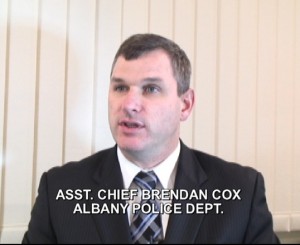Convincing police to support needle syringe programs is not easy. One evidence-based advocacy strategy which has been successful highlighted the benefits of needle syringe programs to police occupational safety (see research papers below). The last thing law enforcement officers want is to put their health and safety at risk – especially at work. Check out the video below to find out more.
Listen to police talk about needle-stick injuries

In 2013, the New York State Association of Chiefs of Police commissioned a YouTube video which provides an overview of New York State’s harm reduction programs: the Syringe Exchange Program, the Expanded Syringe Access Program, and the Opioid Overdose Prevention Program. Developed for New York law enforcement, this video highlights relevant laws which authorize these programs while demonstrating how the service is ultimately delivered in the community. The video includes syringe programs in Ithaca, Bronx and Harlem. Interviews from service programs and law enforcement officials make this a well-rounded and informative production.
Watch the video ‘Syringe Programs in New York State’.
Syringe Law Frequently Asked Questions Podcast
Statewide training on syringe law brought about a number of questions from New York law enforcement. In this podcast we address many of those questions: is there an ID card for possession? Are there limits on the number of syringes that can be possessed? Can minors participate in the programs? Does the law apply to probationers and parolees?
Listen and learn here.
Resources
The NY State Association of Chiefs of Police have also prepared guidance material to help law enforcement officers understand the legislation which supports harm reduction. The Syringe Law and Harm Reduction Resource Sheet is a concise reference guide for police in New York State.
Also available from the nychiefs.org website is a sample policy for Syringe and Harm Reduction programs which any law enforcement organisation can adapt to suit local laws and circumstances. It provides a detailed example for agencies or senior police managers who are preparing their first harm reduction policy to follow.
Research focus
Research in the US has shown that providing information to police about occupational needle-stick injuries also increases their support for needle syringe programs. Read the research below.
Attitudes of police officers towards syringe access, occupational needle-sticks, and drug use: A qualitative study of one city police department in the United States
Leo Beletsky, Grace E. Macalino, Scott Burris
Bundling occupational safety with harm reduction information as a feasible method for improving police receptiveness to syringe access programs: evidence from three U.S. cities
Corey S Davis and Leo Beletsky
Police Training to Align Law Enforcement and HIV Prevention: Evidence From the Field
Leo Beletsky, JD, MPH, Alpna Agrawal, PhD, Bruce Moreau, MA, Pratima Kumar, JD, MPH, Nomi Weiss-Laxer, MA, MPH, and Robert Heimer, PhD




